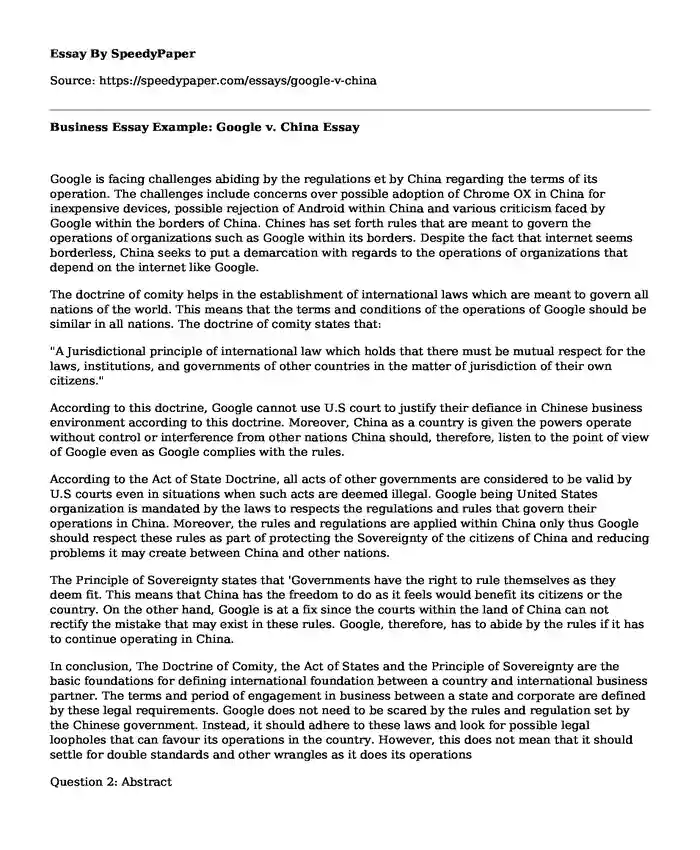
| Type of paper: | Case study |
| Categories: | Google Business law International business |
| Pages: | 3 |
| Wordcount: | 663 words |
Google is facing challenges abiding by the regulations et by China regarding the terms of its operation. The challenges include concerns over possible adoption of Chrome OX in China for inexpensive devices, possible rejection of Android within China and various criticism faced by Google within the borders of China. Chines has set forth rules that are meant to govern the operations of organizations such as Google within its borders. Despite the fact that internet seems borderless, China seeks to put a demarcation with regards to the operations of organizations that depend on the internet like Google.
The doctrine of comity helps in the establishment of international laws which are meant to govern all nations of the world. This means that the terms and conditions of the operations of Google should be similar in all nations. The doctrine of comity states that:
"A Jurisdictional principle of international law which holds that there must be mutual respect for the laws, institutions, and governments of other countries in the matter of jurisdiction of their own citizens."
According to this doctrine, Google cannot use U.S court to justify their defiance in Chinese business environment according to this doctrine. Moreover, China as a country is given the powers operate without control or interference from other nations China should, therefore, listen to the point of view of Google even as Google complies with the rules.
According to the Act of State Doctrine, all acts of other governments are considered to be valid by U.S courts even in situations when such acts are deemed illegal. Google being United States organization is mandated by the laws to respects the regulations and rules that govern their operations in China. Moreover, the rules and regulations are applied within China only thus Google should respect these rules as part of protecting the Sovereignty of the citizens of China and reducing problems it may create between China and other nations.
The Principle of Sovereignty states that 'Governments have the right to rule themselves as they deem fit. This means that China has the freedom to do as it feels would benefit its citizens or the country. On the other hand, Google is at a fix since the courts within the land of China can not rectify the mistake that may exist in these rules. Google, therefore, has to abide by the rules if it has to continue operating in China.
In conclusion, The Doctrine of Comity, the Act of States and the Principle of Sovereignty are the basic foundations for defining international foundation between a country and international business partner. The terms and period of engagement in business between a state and corporate are defined by these legal requirements. Google does not need to be scared by the rules and regulation set by the Chinese government. Instead, it should adhere to these laws and look for possible legal loopholes that can favour its operations in the country. However, this does not mean that it should settle for double standards and other wrangles as it does its operations
Question 2: Abstract
One of the greatest challenges to the operations of Google within the Chinese market is the refusal to accept the trust certificate on its website. Google. Inc has set values, objectives and missions that are not in line with censorship policy in China even though the Company supported the policy. The issues of engagement in business between China and Google are the most important for this paper. Google was forced to relook at its stand concerning censorship mainly by the events that took place in 2010. This had the ripple of the direction of the traffic that China had to Hong Kong. The discussion in this paper involves issues surrounding China Business culture, censorship policies, their effects on the business environment and approaches used by China vis a vie the relationship of these issues with regulations such as Doctrine of Comity, Doctrine of Act of State and the Doctrine of the Principles of Sovereignty.
Cite this page
Business Essay Example: Google v. China. (2022, Mar 31). Retrieved from https://speedypaper.com/essays/google-v-china
Request Removal
If you are the original author of this essay and no longer wish to have it published on the SpeedyPaper website, please click below to request its removal:
- Free Essay on Sexual Health Literacy and Community Nursing
- Personal Essay Example: Overseas Studying Makes Me Independent
- Cyber Security Essay Example for Everyone
- Investment Essay Sample on the Direct Portal Company
- Essay Sample on the Effectiveness of Ninth Grade Mathematics
- Free Essay: Effects and Control of Water Pollution
- Paper Example: Overriding Principles under the IMA
Popular categories




